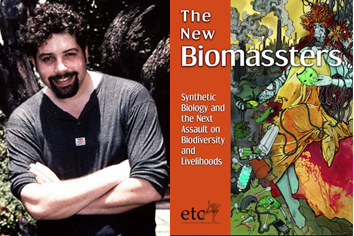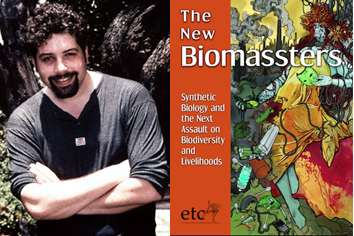 Jim Thomas, ETC GroupI try to stay at the cutting edge of developments in global food politics. But try as I might, I always find myself about five years behind ETC Group, a kind of activist think-tank that promotes the rights of small-scale farmers worldwide against the power of large agribusiness. As I’m trying to tease out the implications of widespread use of genetically modified organisms in the food system, ETC (pronounced “et cetera”; full name: “Action Group on Erosion, Technology and Concentration”) churns out penetrating, impeccably documented analyses of things like nanotechnology and synthetic biology: other corporate-owned technologies that benefit from government research support and lax regulation.
Jim Thomas, ETC GroupI try to stay at the cutting edge of developments in global food politics. But try as I might, I always find myself about five years behind ETC Group, a kind of activist think-tank that promotes the rights of small-scale farmers worldwide against the power of large agribusiness. As I’m trying to tease out the implications of widespread use of genetically modified organisms in the food system, ETC (pronounced “et cetera”; full name: “Action Group on Erosion, Technology and Concentration”) churns out penetrating, impeccably documented analyses of things like nanotechnology and synthetic biology: other corporate-owned technologies that benefit from government research support and lax regulation.
A couple of weeks ago, I penned a critique of cellulosic ethanol, the latest “green” tech fix that’s supposed to keep our vast fleet of cars on the road. Jim Thomas, one of ETC’s crack researchers, emailed me to let me know that he had just come out with a report on just that topic: “The New Biomassters: Synthetic Biology and The Next Assault on Biodiversity and Livelihoods.” In it, he argues that what industrialized countries are calling “the new bioeconomy” is based on using biomass as the feedstuff for fuel as well as power, chemicals, and plastics — and is a bald resource grab of the global South.
Sure enough, Jim’s analysis was approximately five years ahead of mine. So I invited him onto my Victual Reality show, which is part of the Edible Communities project Edible Radio. We talked about the false promise of cellulosic ethanol — which he flatly declared a dead end — and the rise of a synthetic biology in service of synthetic gasoline derived from plant matter. Who’s behind it? The usual suspects: Cargill, Archer Daniels Midland, Monsanto, and BP. Listen and learn.
To download the Thomas interview, go here.



